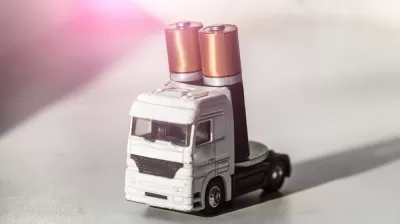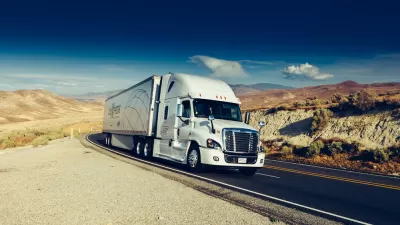Auto manufacturers will offer more battery and plug-in hybrid models this year, and the nation's largest state is expected to approve a new regulation requiring medium and heavy-duty truck manufacturers to sell zero-emission vehicles.

Expect to see the electrification of transportation continue in 2020, writes Skip Descant for Government Technology on Jan. 2, covering a wide range of vehicles from e-scooters to big rigs.
Those shopping for new electric vehicles (EVs) will find more models, and many existing models will have larger batteries enabling greater mileage range. Amazon has ordered 100,000 battery-electric delivery vans from Michigan-based Rivian to begin service next year, and public transit agencies throughout the country are ordering more electric buses.
A year ago, California became the first state to mandate that all public transit agencies transition to zero-emission bus fleets by 2040, and this year it appears that the Golden State will become the first to require the incremental electrification of all types of trucks, from pickups to parcel delivery trucks to tractor-trailers.
Last month, Descant reported that the "California Air Resources Board (CARB) spent roughly four hours Thursday [Dec. 12] hearing testimony from more than 100 organizations, government officials and residents related to the proposed Advanced Clean Trucks Regulation that could require the gradual phasing of big-rig and other trucks over the next decade."
The proposal is billed as landmark in its ability to transform a major component of the transportation sector, and one that is credited with producing a disproportionate amount of air-pollution and greenhouse gas emissions.
“This is a very important, and as far as we know, groundbreaking piece,” said Mary Nichols, CARB chair, in her opening comments at the meeting.
CARB states that the goal of the Advanced Clean Trucks program is to "achieve NOx and GHG emission reductions through advanced clean technology, and to increase the penetration of the first wave of zero-emission heavy-duty technology into applications that are well suited to its use."
Fleets that operate in urban centers, have stop and go driving cycles, and are centrally maintained and fueled are well suited for introducing zero-emission technology.
According to CARB's fact sheet on the regulation, "[m]anufacturers who certify Class 2B-8 chassis or complete vehicles with combustion engines would be required to sell zero-emission trucks as an increasing percentage of their annual California sales from 2024 to 2030."
"One of the proposed sales requirements would have heavy-duty ZEV [zero-emission vehicle] big-rigs reach 15 percent by 2030," adds Descant.
However, speaker after speaker Thursday, urged the board to reach further, saying the proposal was too weak, in light of the high levels of air pollution found in many parts of California and the urgency to reduce the greenhouse gas emissions climate change has called glaring attention to.
“I think 15 percent is a good starting point,” said Allen Hernandez, speaking on behalf of the Center for Community Action and Environmental Justice (CCAEJ),based in Riverside, Calif., calling attention to the 2030 goal, which CCAEJ would set as the starting point in 2024.
Despite pushback from the trucking community on reporting and purchase requirements, the environmental and public health arguments resonated with some board members, including Nathan Fletcher, also a member of the San Diego Board of Supervisors,
“When we’re talking about a 2030 goal, we’re talking about something that is more than a decade away, in an industry that is vastly changing,” said Fletcher. “And if we are not more aggressive in setting our targets and we’re not more aggressive in setting goals for things that area decade from now, then I think we’re missing out on the potential to create that market force.”
The final decision by CARB on the proposal is expected this spring. In an update to her piece on the regulation, Rachel Becker of CalMatters reports that the board is expected to "toughen [the] proposed rule."
Related in Planetizen:
-
Did the Outlook for Electric Vehicle Sales in U.S. Just Nosedive? September 21, 2019
-
Two New California Laws Take Aim at Pollution from Heavy-Duty Trucks, October 1, 2019
-
California Orders All Electric Buses by 2040, December 18, 2018
Hat tip to Streetsblog California.
FULL STORY: The Electrification of Transportation Trend to Continue

Alabama: Trump Terminates Settlements for Black Communities Harmed By Raw Sewage
Trump deemed the landmark civil rights agreement “illegal DEI and environmental justice policy.”

Planetizen Federal Action Tracker
A weekly monitor of how Trump’s orders and actions are impacting planners and planning in America.

Why Should We Subsidize Public Transportation?
Many public transit agencies face financial stress due to rising costs, declining fare revenue, and declining subsidies. Transit advocates must provide a strong business case for increasing public transit funding.

Understanding Road Diets
An explainer from Momentum highlights the advantages of reducing vehicle lanes in favor of more bike, transit, and pedestrian infrastructure.

New California Law Regulates Warehouse Pollution
A new law tightens building and emissions regulations for large distribution warehouses to mitigate air pollution and traffic in surrounding communities.

Phoenix Announces Opening Date for Light Rail Extension
The South Central extension will connect South Phoenix to downtown and other major hubs starting on June 7.
Urban Design for Planners 1: Software Tools
This six-course series explores essential urban design concepts using open source software and equips planners with the tools they need to participate fully in the urban design process.
Planning for Universal Design
Learn the tools for implementing Universal Design in planning regulations.
Caltrans
Smith Gee Studio
Institute for Housing and Urban Development Studies (IHS)
City of Grandview
Harvard GSD Executive Education
Toledo-Lucas County Plan Commissions
Salt Lake City
NYU Wagner Graduate School of Public Service





























